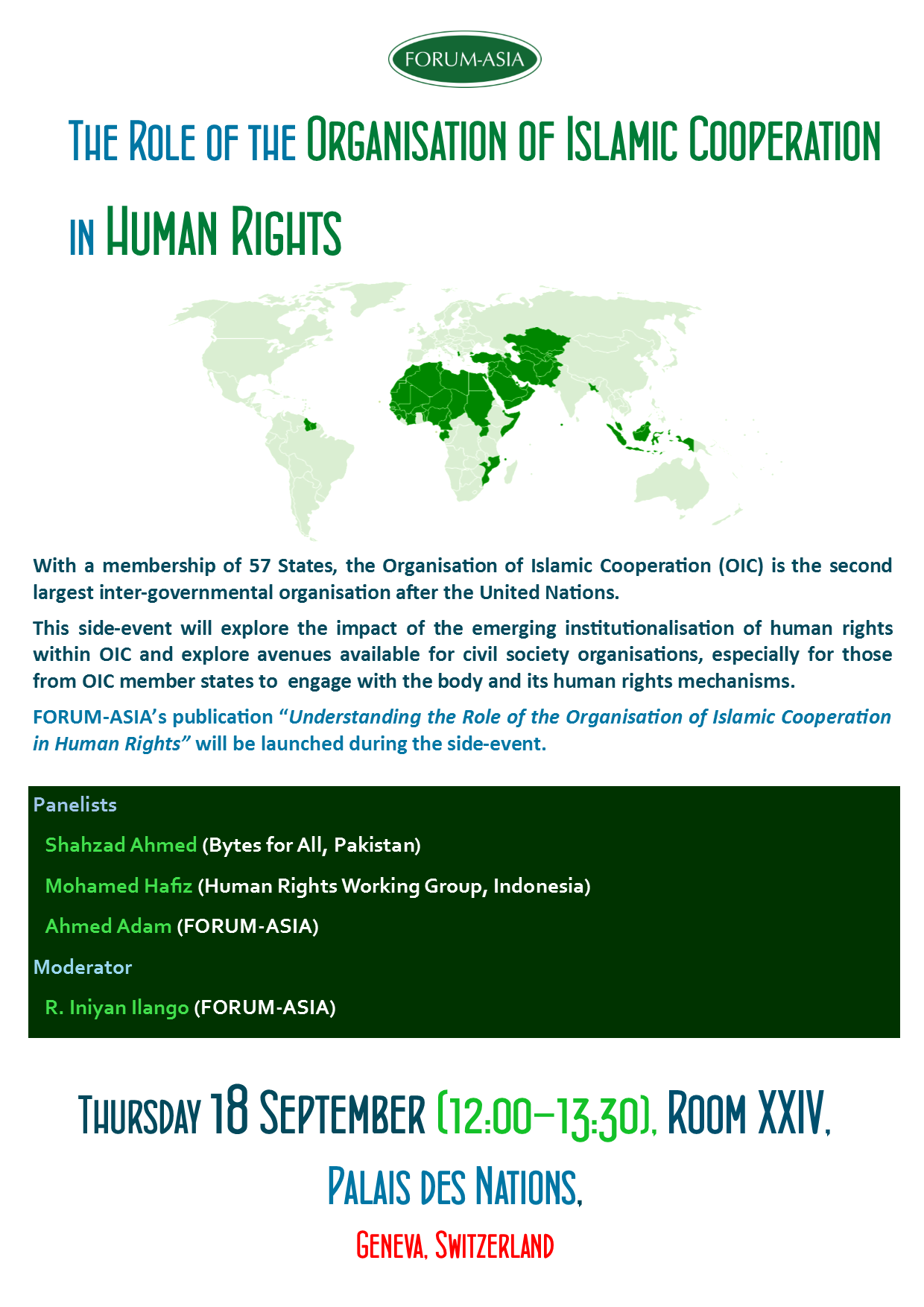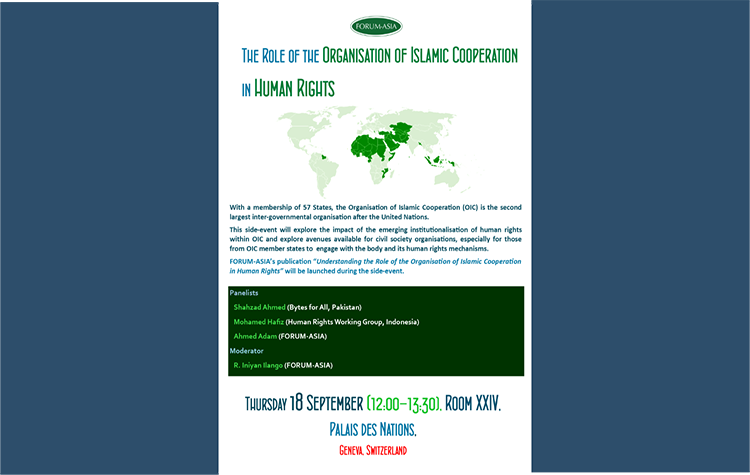
The Role of the Organisation of Islamic Cooperation in Human Rights
Organised by the Asian Forum for Human Rights and Development (FORUM-ASIA)
![]()
The Organisation of Islamic Cooperation’s (OIC) new Charter of 2008 and the establishment of an Independent Permanent Human Rights Commission (IPHRC) have been seen as expressions of the body’s desire to enhance its relevance and legitimacy among the peoples of member States and promote its credibility at the international level.[1] In a global geopolitical framework where Southern countries and South based groupings are increasingly attempting to play greater roles, OIC’s entry into the human rights arena in a big way may have a significant impact on global human rights discourse as well as issues that concern the global South. In fact at UN human rights forums, as the second largest intergovenmental organistion, OIC holds considerable sway in global dynamics related to human rights. The move towards an increasingly institutional role for human rights within OIC, has come side by side with an increase in internal debate about human rights situations in member countries, such as Syria and Libya, marking a significant shift from its earlier focus on human rights in Palestine and of Muslim minorities in non-OIC member States.
This side-event aims to explore the impact of the emerging institutionalisation of human rights within OIC and explore avenues available for civil society organisations, especially for those from OIC member states to engage with the body and its human rights mechanisms.
FORUM-ASIA’s publication: ‘Understanding the Role of the Organisation of Islamic Cooperation in Human Rights’ will be launched at the side event. The publication is the first in a series entitled “FORUM-ASIA Working Paper Series: Asian Perspectives on International Human Rights Landscapes”
Key issues to be discussed at the event include include:
- The OIC’s human rights mechanisms and discourse
- The IPHRC, its potential, mandate, structure and role in the protection and promotion of human rights
- The experience of Asian civil society organisations in engaging with OIC and its human rights mechanisms
Background
The Organisation of the Islamic Cooperation (OIC)[1] is the second largest inter-governmental organisation after the United Nations, with a membership of 57[2] States (including Palestinian Territories). All of these 57 States are from the global South and include several countries that are emerging today as influential players in the world stage. 26 out of 57 OIC Member States belong to Asian region.
OIC has taken a number of steps towards incorporating international human rights norms since it embarked on a reform programme that began in 2005 and culminated in 2008 with the adoption of a revised Charter which replaced the Charter of 1972. The new Charter expresses the OIC’s determination to “promote human rights and fundamental freedoms, good governance, rule of law, democracy and accountability”, and “safeguard and promote the rights of women and their participation in all spheres of life” in member States in accordance with domestic legislation. In one of the most significant developments pertinent to human rights, the new Charter paved the way for the establishment of the OIC’s Independent Permanent Human Rights Commission (IPHRC) as one of the primary organs of the OIC, mandated to “promote the civil, political, social and economic rights enshrined in the organisation’s covenants and declarations and in universally agreed human rights instruments, in conformity with Islamic values.”[3]
OIC adopted the Statute of IPHRC in June 2011. Broadly, the mandate of IPHRC is limited to carrying out consultative and advisory tasks for the OIC Council of Foreign Ministers, rather than investigative or protective functions. Specifically, functions of the IPRHC include, among others, supporting OIC’s position on human rights at the international level, providing technical cooperation and consultancy in the field of human rights and awareness-raising about human rights in member states, promoting and supporting the role of national human rights institutions and civil society organisations working on human rights, conducting research on priority human rights issues, and recommending refinement to OIC’s human rights instruments in harmony with Islam and international standards.
The 18-member Commission is headquartered in Jeddah, Saudi Arabia and is required to meet bi-annually Since its inception it has met five times. Between the first meeting held in Jakarta, Indonesia in February 2012 and fifth meeting held in June 2014 in Jeddah, Saudi Arabia, IPHRC has adopted its Rules of Procedure (RoP) and finalised the standing agenda. IPHRC RoP is a relatively progressive document that apppears to adopt a somewhat expansive interpretation of the IPHRC Statute to allow IPHRC to space and flexibility in interpreting its mandate to independently promote human rights and to expand IPHRC activities to include protection and promotion of human rights, as opposed to the advisory role given to it in the Statute. Permanent items on the standing agenda are civil, political, economic, social and cultural rights in OIC Member States; human rights situation in Palestinian and other Arab territories; and human rights issues on the OIC agenda. However, in keeping with OIC tradition, IPHRC’s RoP and agenda are conspicuously silent on the protection and promotion of human rights of Muslim and non-Muslim minorities in OIC member states.
Establishment of the IPHRC, which OIC claims is symbolic of the increasing prominence of human rights andinstitutional reforms within the OIC,[4] was accompanied by an increasing willingness to engage with civil society. The Statute requires IPHRC to promote the role of national human rights institutions and civil society organisations working in the field of human rights an cooperate with them. However, despite these statutory guarantees of IPHRC’s cooperation with civil society, IPHRC has been reluctant to engage with civil society organisations. Consecutive meetings of IPHRC continue to defer the adoption of draft institutional procedure for the engagement with civil society organisations. This coupled with the selection of Jeddah, Saudi Arabia, as the headquarters of the IPHRC raise questions about IPHRC’s willingness to cooperate with civil society as well as the space available for civil society to work with IPHRC.




